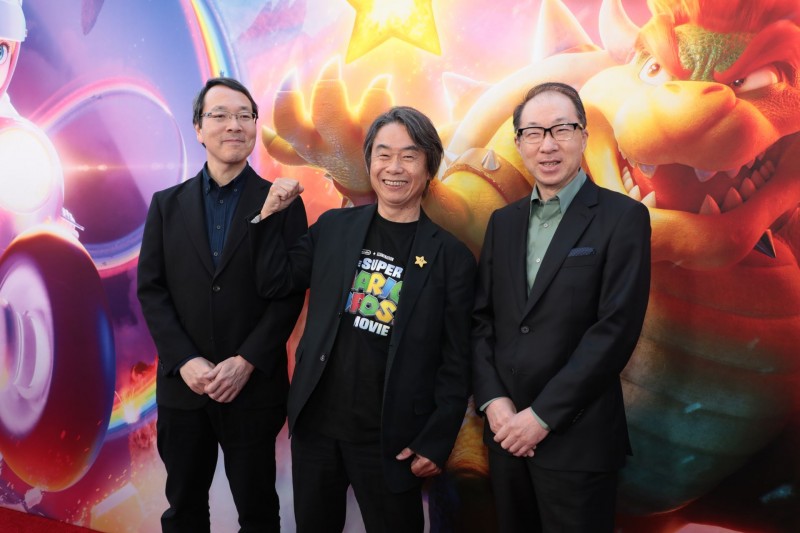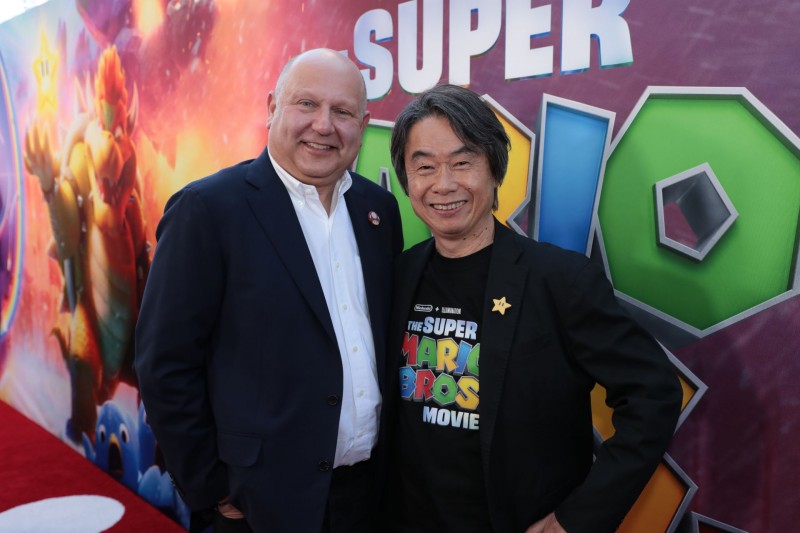
After a decade of planning and cross-company collaboration, The Super Mario Bros. Movie is finally out today. The project comes from production company and distributor Universal Pictures and animation studio Illumination. Notably, the trio of production teams involved with this film is rounded out by Nintendo, the legendary company responsible for the creation of Mario nearly four decades ago. Nintendo was involved not as a licensor but as a partner with Illumination and Universal.
Every step of the way, Mario creator Shigeru Miyamoto, who is credited as a producer on this film alongside Illumination CEO Chris Meledandri, had creative input regarding the story, characters, and references to the games. Meanwhile, Koji Kondo, who is responsible for many of the iconic songs from the Super Mario series, acted as a score consultant, working with the movie's composer, Brian Tyler.
Following last weekend's premiere of The Super Mario Bros. Movie in Los Angeles, California, we sat down with Shigeru Miyamoto and Koji Kondo for a rare double interview to hear their thoughts on the movie, talk about the collaboration, and more. You can read the full transcript below.
How have you found the reaction to the Super Mario Bros. Movie now that other people have finally seen it?
Koji Kondo: Well, everyone laughed at the right times. They had the right reactions with the right moments of the film that we were hoping for. I saw a lot of children who seemed to be enjoying the movie as well, so it was fantastic!
Shigeru Miyamoto: So, in Japan, this obviously hasn’t aired yet, and so we’ve only been able to show it for people who are involved. Just the way that Japanese culture is, people don’t laugh or emote very much during the movie if it’s enjoyable. You know, they’ll tell us it was very funny and enjoyable afterward. So it was the first time that we were able to see the movie with an audience in the States, and it was great to be able to hear some of the emotion that was coming out of it.
 Illumination's Chris Meledandri and Nintendo's Shigeru Miyamoto at last weekend's premiere in Los Angeles
Illumination's Chris Meledandri and Nintendo's Shigeru Miyamoto at last weekend's premiere in Los Angeles
When you look at the vision you had for this film when the partnership with Illumination first started, how did the final product differ?
SM: When we talk about vision, I think really this whole thing started between Mr. Chris Meledandri and me, and our discussion and how the way we create things is very similar. So, we felt that by working together, we’ll be able to create something that’s going to work, and that’s how the discussion started. So rather than having a vision of what the movie is like, it was more like the vision was being able to do something creative with Chris, and then that’s how the discussion about the movie started.
And with all that said, I think it worked out great. As the movie takes shape, there’s a lot of complex moving parts that we need to deal with, but I think both Chris and I were really able to work together well with each of our teams, and the teams took some of the feedback and opinions that we had to heart and were able to work really well. I think overall, it worked out great.
In terms of vision as in content, obviously we want to create something that’s enjoyable, that’s fun. And one of the goals was obviously to make sure that we’re able to create a movie that a lot of fans of gaming and Mario games can really feel satisfied in watching, but at the same time, it’s not going to work if it’s a movie that only core game fans are going to understand, so you have to make it enjoyable and fun for everybody.
And so that was kind of the underlying principle. There’s a lot of discussion around this that happened. And as we’re creating this, we realized that a lot of the staff at Illumination working on the film were fans themselves. So, there’s a lot of content and Easter eggs that went into the film without us knowing. I think the balance of what’s enjoyable for core game fans and what’s enjoyable for everyone else – I think we struck a good balance there.
And that’s the thing about this movie: There are so many references that stretch all the way back to before even the original Super Mario Bros. and all the way up to things as recent as Bowser’s Fury. Why was it important to include references for the entire spectrum of the series?
SM: While we were working on the screenplay, we had a lot of people provide as objective feedback as possible in the process. The feedback we got a lot of times was it’s a screenplay that’s really dynamic. From our perspective, all we were doing was lining up Mario elements as we would in a game, and through that process, we realized that perhaps Mario is a game that has a lot of content, but not a lot of dynamic changes within the game itself, so that was something that we were able to kind of relearn and reconfirm on our end.
And then also, as we do that, then we start putting elements like Donkey Kong in the movie. And so, this provided us with an opportunity to see that there is a way to create something that has all of these elements and extends to sort of a Mario family. To be able to see that it works to have all those elements in one place was a new learning for us too.
When we’re making a movie and we’re working on the screenplay, I think it’s natural that there’s a tendency or desire to create something new – a new character specifically for this. When that came up – and there was a lot of content that was outside of what we have – and this is something that I also share with other projects or even when we’re working on the theme park – that there’s plenty of assets and content in the Mario world that we can use. So let’s start there, and let’s see what we can use there. We realized that after putting all of that into the movie there’s so much that the Mario world has that we still have leftovers that we weren’t able to use.
 Meledandri and Miyamoto pose with the cast of the Super Mario Bros. Movie
Meledandri and Miyamoto pose with the cast of the Super Mario Bros. Movie
Why do you think Mario is a character that has remained popular across so many generations?
SM: I think one aspect is that we’ve been close to 40 years developing Mario, and players who have been playing Mario, some of them are 40 years older, and I think that’s one aspect to consider. The other aspect is the gameplay experience itself. It’s very intuitive in that when you see a hole in the ground, you know to jump over it. When there’s a high place, you want to climb it. That’s something that they tried to recreate using the controller, and then, as they’re playing and as they’re interacting with what’s on-screen with their body, it comes to a point where it’s almost like an illusion that they’re actually doing the actions themselves.
When that intuitive and direct connection happens then, people are encouraged to say, “I want to try this. I want to go there. I want to challenge this.” And then, through that, they’re rewarded with other gameplay experiences. That feedback it creates, I think that’s the kind of gameplay that Mario is, and this is probably why it can be so appealing to so many different people across both ages, but also across cultures and countries.
As I mentioned, in a gameplay experience, it really is intuitive and a direct feeling you use your body to go through that experience. But when it comes to movies, it’s a little bit different. What we focused on is really trying to create the illusion that Mario might be someone that might actually exist in the real world, and that’s something that’s a creative endeavor that we discussed, both Chris and I, about how to make that a reality.
Once that came to fruition, I was able to see the movie and recreate the story around that goal of trying to make Mario feel like he’s someone real. While there are fantastical and unreal creatures, that’s the goal we were going for and to see it come to life in the movie, and once it was done, I feel like we were able to get close to that point. It was something that I’m really happy we were able to achieve.
In getting back to the references in the movie, the songs and the compositions from the games really translate well to complement the cinematic moments of the movie. What do you attribute to that?
KK: Well, that’s really all thanks to Brian [Tyler], who is the composer of the movie score. We originally planned for him to do the entire movie, so what we did on my end was look at different scenes from the movie and made up a list of music that I thought would enhance them that would work well with the movie. And then I sent that off to Brian, not with any order, like, “Hey, use this” or anything like that, but he was able to take the suggestions and incorporate them into something that became so cinematic, as you described.
